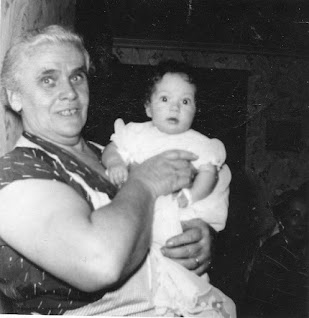They say scents are one of the most
evocative prompts for memories, and that is certainly true for me. Whenever I
catch the scent of vanilla, I close my eyes and immediately I can see my
beloved Baba Dulchewsky, wide face creased in a smile under
thick bushy eyebrows, grey hair pulled tightly back, her chunky body encased in
a long cotton house dress with a broad homemade apron tied around her waist and
covering her ample bosom.
My maternal grandparents emigrated from Russia,
where the word for grandmother is Baba, and the word for
grandfather is Gydo (JEE-doh). They never spoke completely in
English – their conversation was a blend between what little English they knew,
and the Russian they were more comfortable with.
The strong vanilla scent came from the nearby
Thorold paper mill, just one block away, where my Gydo worked.
In the 1950’s they cured the paper in vanilla, and it permeated their
neighborhood, flavouring the air for miles around.
Back in those days there was no Thorold tunnel.
When we went to visit, we often had to wait for almost an hour to cross a
raised bridge on the Welland Canal that led to Baba and Gydo’s tiny
home in Thorold South. I would always roll my window down in the car – even a
crack on the coldest days – to catch those first trickles of vanilla,
anticipating a warm and loving welcome.
There are more scents that evoke memories of
my Baba. My earliest memory, just one brief flash in my first year,
is of sitting in Baba’s wide plump lap – her dipping small
pieces of homemade bread in a small bowl of milk and feeding them to me.
Her clothing redolent of cabbage, bacon, onions,
and flour. You see, my Baba was an incredible cook and baker.
She made everything from scratch, and to this day, I still use her simple
recipe for holubtsi (HOLL’up-chee), better known as cabbage
rolls. And whenever I make pyrohy (PEH’ roh-HEH), which most
people know as peroghi.
Baba always had an empty red and white Campbell’s
soup can beside the stove, in which she kept her bacon grease, carefully
scraped from her wide cast iron frying pan after every bacon fry. When the time
came to cook the pyrohy, she would first boil them, to seal them.
She’d then scoop out a generous wad of filmy bacon
grease out of her soup can and ease it into her frying pan along with a handful
of chopped onions. The pyrohy would be dropped into this
aromatic blend, sizzling and steaming until both sides had a light crust of
brown.
At that point, she’d fill one of her pale green
depression plates with a pile of them, and add an overly generous dollop of
sour cream. As we ate, she’d hang over us at her grey kitchen table beside the
window, nodding and encouraging us with, “Yeeshch! Yeeshch!”
“Eat! Eat!”
In a Russia where she had starved, making and
serving food was the strongest form of love, and she showed us this love every
time we came to visit.
To this day I make holuptsi and pyrohy every
fall and winter using Baba’s recipes from the old country -
usually at the first snowfall. As the delectable scents of cabbage, bacon
grease, and onion flavour the air, I am transported back to Baba’s kitchen,
and I can almost hear her deep, heavily-accented voice lovingly encouraging me,
“Yeeshch, malen’kiy, Yeeshch.”
And once again, I’m a little girl, loved and
loving, lost in a rare sweet memory of unsullied innocence.
Tya Colby made a living writing
nonfiction in every way possible for 35 years: radio newscasts, investigative
reports, video scripts, radio & television commercials, magazine articles –
to name a few. Now she is writing nonfiction from a personal standpoint, currently
working on a childhood autobiography.
She also writes fiction. Her first attempt – an
erotic story entitled Ageless Love (written in one of Brian’s
workshops) – ended up winning first prize in a national contest and has also
been published in the short story book, Moist.
She prefers writing stories or poetry with a twist
at the end, so that you feel compelled to read the story again. There is always
more to a situation than many people realize, and she likes to shake people up,
have them reframe the way they judge situations and people – in fiction, and in
real life.
See upcoming weekly writing classes,
one-day workshops, and four-day retreats here.
Read more short stories, essays, and reviews by your fellow writers here (and scroll down).




No comments:
Post a Comment
Note: Only a member of this blog may post a comment.